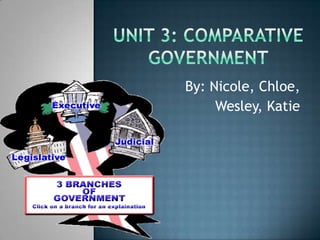
Unit 3 comparitive government
- 1. By: Nicole, Chloe, Wesley, Katie
- 2. Main job is to make laws. Bicameral legislature (2 houses in legislature), made of Senate and House of Representatives. Sessions run for 2 years and start on January 3rd of odd numbered years. As of today (January 3rd, 2013) congress is in it’s 113th Congressional Session.
- 3. 435 members. Number of representatives from each state is based on population. Terms are 2 years with no term limit. Qualifications: 1. Must be at least 25 years old 2. Must be citizen for at least 7 years 3. Must live in state/district they represent North Carolina has 13 representatives.
- 4. 100 members. 2 from each state. 6 year term with no limit. 1/3 of the Senate is elected every 2 years to provide stability in congressional leadership positions. Qualifications: 1. 9 years as a U.S. Citizen 2. At least 30 Years old 3. Live in the state/district you represent Voters directly vote for U.S. senators, stated in the 17th ammendment
- 5. Delegated/Expressed/Enumerated ImpliedPowers (Deemed “necessary and proper” through elastic clause.) Others Examples: Power to tax Declare war Regulate Commerce and Currency
- 6. Begin Impeachment Process Elect President/Vice President if no candidate receives majority of votes. Originate all appropriation/tax/money bills Serve as jury for Impeachment Process. Ratify treaties Approve/reject presidential appointments
- 7. Over Executive Branch: Override presidential veto, impeach president, reject/approve appointments, reject/approve treaties. OverJudicial Branch: Impeach judges, reject/approve treaties
- 8. Made up of President, Vice President, Cabinet, and Large Bureaucracy. Main job is to enforce laws. President, Vice President, Cabinet
- 9. Qualifications: Must be at least 35 years old. Natural born U.S. Citizen Must live in U.S. for 14 years. Term: Only 2 terms allowed (22nd Amendment) or a total of 10 years as president. Same qualifications as the President Leader of the Senate All responsibilities come from the president Term is 4 years but there are no term limits, however no one has been Vice President more than once.
- 10. 1. Vice President 2. Speaker of the House 3. President Pro Tempore 4. Secretary of State 5. Secretary of Treasury 6. Secretary of Defense 7. All the way down the executive departments in the order of creation.
- 11. Chief Executive: Carry out the laws of the nation Chief Legislative Leader: Approves /vetoes laws, suggests legislation to congress, and prepares federal budget. Chief Diplomat: Appoints ambassadors to other countries, makes treaties (needs approval from senate), and executive agreements Chief Judicial Leader: Appoints federal judges, grants amnesty, pardon, and reprieves.
- 12. Chief of State: Symbolic or ceremonial position, represents U.S. Party Leader: Most visible and influential member of political party. Commander in Chief: Leader of the military, War Power Act allows President to move troops to foreign countries for up to 60 days.
- 13. Over Legislative Branch: Veto legislation passed by Congress. Over Judicial Branch: Appoint federal judges
- 14. Job is to interpret laws passed by Congress and actions of the executive branch. Consists of Supreme Court and other federal judges. Term is for life. Supreme Court is made of one Chief Justice and eight Associate Judges.
- 15. Federal District Court (94): Have original jurisdiction (over specific geographical area) and is the only court that has trial by jury. Federal Court of Appeals (12): Have appellate jurisdiction (authority to hear the case on an appeal from a lower court) only over several states and have a panel of 3 judges to make sure rights weren’t violated by lower court. Supreme Court (1): Jurisdiction is the entire U.S. and its territories.
- 16. Over Legislative Branch: Can declare laws passed by congress unconstitutional. Over Executive Branch: Declare acts of president unconstitutional. Judicial Review (the ability to determine if an action of the president or law passed by Congress is constitutional) was established by the case Marbury vs Madison
- 17. How a Bill Becomes a Law http://www.youtube.com/watch?v=VxT7QjlvDqM 3 Branches of Government http://www.youtube.com/watch?v=x5M50xBz1cU